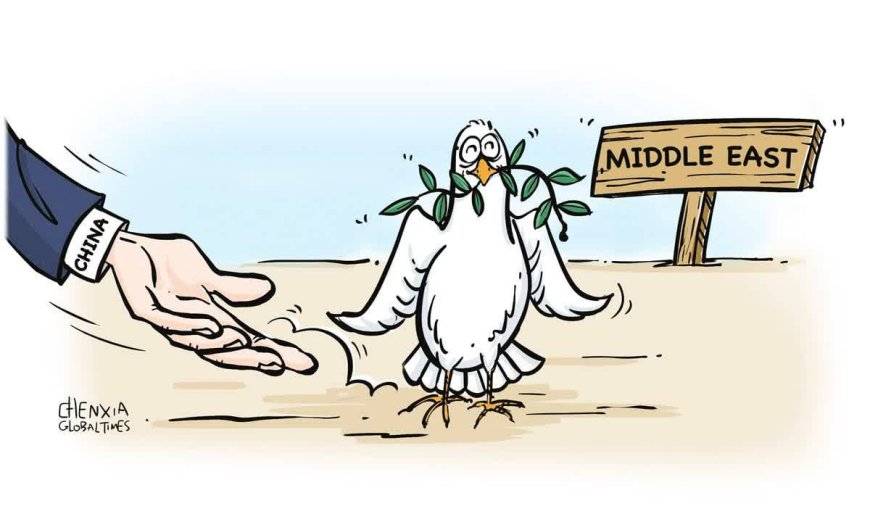The Rise of China: A Beacon of Peace and Prosperity in a Troubled Middle East

By: M. Sharifi
The Middle East, the cradle of civilization, now finds itself embroiled in a complex tapestry of conflicts: territorial disputes, ethnic tensions, ideological clashes, and economic struggles. This volatile landscape, further complicated by the unwelcome interference of external powers, has left the region teetering on the precipice of instability.
The United States, with its long history of interventionism and its unwavering support for the Israeli regime, has exacerbated the region's woes, acting as a destabilizing force rather than a guarantor of peace. However, amidst the chaos, a new player has emerged, offering a glimmer of hope and a path towards a more prosperous future: China.
With its steadfast commitment to peaceful diplomacy and its deep understanding of the region's complexities, China has positioned itself as a crucial catalyst for stability and development in the Middle East.
A New Paradigm for Regional Engagement
Under the visionary leadership of President Xi Jinping, China has embarked on a bold initiative to redefine its role in global affairs, actively promoting a multi-polar world order based on mutual respect and cooperation. This paradigm shift is reflected in China's strategic approach to West Asia, a region of critical importance to its economic interests and national security.
China's approach is marked by a fundamental respect for sovereignty and non-interference in internal affairs. Unlike the West, which has often resorted to military force and regime change, China has consistently advocated for peaceful resolutions to conflicts, emphasizing dialogue and mutual understanding as the foundation for long-term stability. China's commitment to peace and stability in West Asia is not mere rhetoric; it is evident in its concrete measures:
Mediating Conflicts: China has actively engaged in mediating disputes within the region, most notably playing a pivotal role in the normalization of relations between Iran and Saudi Arabia, a landmark achievement that has the potential to transform the regional landscape.
Promoting Dialogue: China has facilitated dialogue between Palestinian factions, bringing together representatives of Fatah and Hamas in a bid to bridge the divide and foster unity among the Palestinian people. This initiative has garnered significant international attention and offers a realistic path towards a lasting solution to the Palestinian issue.
Economic Cooperation: China's Belt and Road Initiative (BRI) is a testament to its commitment to shared prosperity. This ambitious project, encompassing infrastructure development and economic integration across Eurasia, has generated significant investment and opportunities in West Asia, creating new avenues for economic growth and development.
A Vision for a Shared Future
China's engagement in West Asia is rooted in a deep understanding of the region's historical and cultural complexities. China acknowledges the importance of inclusivity and respect for diverse perspectives, as it actively advocates for a multi-polar world where all nations, regardless of their size or ideology, have a voice and a role in shaping their destinies.
By advocating for dialogue, promoting economic cooperation, and actively seeking peaceful resolutions to conflicts, Beijing is demonstrating its commitment to a brighter future for West Asia. This commitment is not driven by self-interest or imperial ambitions, but by a genuine desire for a more peaceful, stable, and prosperous world.
China's emergence as a key player in West Asia offers a unique opportunity for the region to break free from the cycle of violence and instability. By embracing China's vision for a multi-polar world, West Asia can embark on a new path towards a shared future characterized by peace, prosperity, and mutual respect.













































